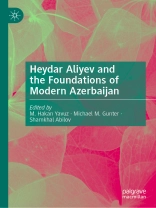This edited book examines and analyses Heydar Aliyev, the architect and founder of modern, post-Soviet Azerbaijan. The editors of the volume discuss developments between 1993 and 2003 – a decade that saw the establishment of the institutional foundations of the current republic, the adoption of a new form of national identity, the redefinition of the concept of the Azerbaijani state, and the creation of a security establishment designed to gain control of territories Armenia had held since the 1988-1994 war over Karabakh. The book explains why this fateful period had far-reaching consequences for Azerbaijan as a fully formed state and society, as well as major implications for its political future and its geopolitical strategy.
Innehållsförteckning
Introduction.- The Architect of State and Nation-Builder.- Political Leadership Understanding Heydar Aliyev through Insights from Charles De Gaulle and Abraham Lincoln.- The removal of Heydar Aliyev from the Politburo.- The Successful Implementation of the Energy Strategy by Azerbaijan as a Small Power to Achieve National Interests.- Secession and Peace Processes The Leadership of Heydar Aliyev.- The Foreign Policy of Heydar Aliyev.- Azerbaijans Relations with Russia during Heydar Aliyev.- Azerbaijan USA relation 1991 to 2003.- The Evolution of Strategic Relations between Azerbaijan and Israel during the Heydar Aliyev Period.- Bilateral Relations between Azerbaijan and Iran during the Heydar Aliyev Period.- One Nation Two Leaders Foreign Policy of Heydat Aliyev and Suleyman Demirel.
Om författaren
M. HAKAN YAVUZ is Professor of Political Science at the University of Utah, USA.
MICHAEL M. GUNTER is Professor of Political Science at Tennessee Technological University in Cookeville, Tennessee, USA.












